

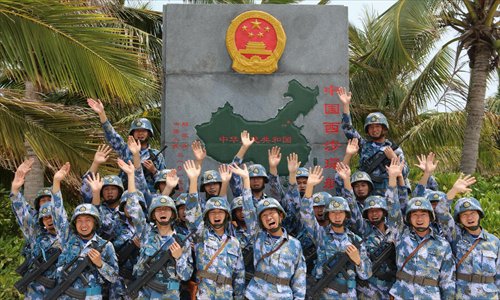 |
| Chinese soldiers guard Yongxing Island in the South China Sea. (Guo Yuandan/GT) |
Students attend a class at Yongxing Elementary School. Photo: Guo Yuandan/GT
Protecting the right
According to the People's Liberation Army (PLA) Daily, the ratio of soldiers to civilians is three to one on the Yongxing Island.
Zhang Yao, 24, has been serving on the island ever since he joined the army when he was 17. Standing at a boundary marker with a rifle in hand, Zhang told the Global Times that the road the reporters were walking across used to be a small dirt road, but now it has been transformed into a wide seawall highway, which is nearly 1 kilometer long and about 5 meters wide.
The tremendous improvement was achieved through the efforts made by Chinese naval officials and soldiers. In December 2015, PLA Navy Commander Wu Shengli summed "the spirit of Xisha and Nansha islands as well as the spirit of nuclear submarines" as the Chinese navy's spirit, which is to "listen to the Party's command and be loyal to the Party; be able to win the battle and fight the hard battle; maintain strict discipline and serve the people; love the ship, the islands and the sea."
As the Xisha Islands lack fresh water, there is a "rainwater squad" which consists of soldiers who are responsible for collecting rainwater, purifying it and then sharing fresh water. Back in 1999, a rainwater purifying reservoir was built in the region. Since then, the soldiers have purified more than 1.2 million tons of rainwater, which is equal to 66.67 million 18 liter barrels of water.
There is another well-known squad called the "Lei Feng squad," named after a Chinese role model for selflessness. They help civilians on the islands repair their household appliances, cars and machinery as well as aid them if they are in danger when fishing.
For tourists, the scenery on the islands is splendid. But for people actually living there, they have to face high temperatures, high humidity, high salinity and water shortages. In the summer months, the male soldiers don't wear their white summer uniforms. A soldier explained that this is because the white clothes stain easily and they don't have enough water to wash them.
Liu Tang, a commander of a naval garrison on the Xisha Islands said that during their daily training, the armed forces carry out air defense maneuvers, practice repelling landings and perform other military drills.
"Recently, because the US frequently played little tricks in the South China Sea, the soldiers' initiative and consciousness of training become even stronger. They want to train. While the intensity and the difficulty level of training is higher, they complain less," Liu told the Global Times.
Despite their devotion to training, China has paid great attention to protecting the ecosystem on the islands.
Wang Xianzhong, an engineer with Yongxing's navy, told the Global Times that the solders have grown trees and other vegetation.
When the country and the Party's leaders and the military generals visit the islands, they plant a coconut tree. Now there are more than 1,400 coconut trees. Catching turtles and picking coral is forbidden. Some household garbage is transported to the mainland for disposal. There is also a sewage disposal system on the island.
Aside from making contribution to island construction, officials and soldiers also have a good command of international law. Staff officer Jin Lei is familiar with the clauses of the United Nations Convention on the Law of the Sea, which he said is the law most frequently used by the Chinese navy in the South China Sea.
Jin said that the US has a long history of using international law. Although China started late, now it can "use the law for our purposes."
He recalls that in the past, they only took photographs of foreign ships which were hard to use as evidence. "Now when we find the other side's vessels, we will use the Beidou navigation system installed on our vessel to report our location and the other side's and then record the whole situation and each other's heading course in video. Then it will be easier to judge who violated the international law," Jin said.
For those foreign ships which illegally fish in China's waters, Jin said "we will report them to coast guard, maritime department and let the public service ships deal with them."
 |  |
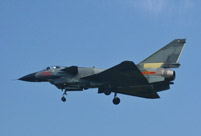 The evolution of J-10 fighter
The evolution of J-10 fighter Top 10 Asian beauties in 2016
Top 10 Asian beauties in 2016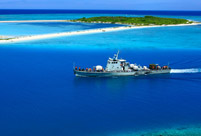 What's happening in Xisha Islands?
What's happening in Xisha Islands? When female soldiers meet flowers
When female soldiers meet flowers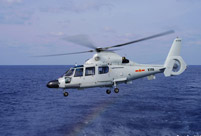 North Sea Fleet conducts drill in West Pacific Ocean
North Sea Fleet conducts drill in West Pacific Ocean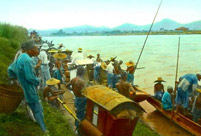 Old photos record the change of Sichuan over a century
Old photos record the change of Sichuan over a century Breathtaking aerial photos of tulip blossoms in C China
Breathtaking aerial photos of tulip blossoms in C China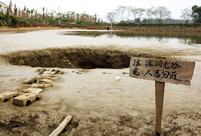 Horrific: Pit swallows 25 tons of fish overnight
Horrific: Pit swallows 25 tons of fish overnight Vietnamese Su-30 fighters fly over Nanwei Island in South China Sea
Vietnamese Su-30 fighters fly over Nanwei Island in South China Sea Top 20 hottest women in the world in 2014
Top 20 hottest women in the world in 2014 Top 10 hardest languages to learn
Top 10 hardest languages to learn 10 Chinese female stars with most beautiful faces
10 Chinese female stars with most beautiful faces China’s Top 10 Unique Bridges, Highways and Roads
China’s Top 10 Unique Bridges, Highways and Roads High-profile cases of child abuse are just the tip of the iceberg expert
High-profile cases of child abuse are just the tip of the iceberg expert Film watchdog orders online celebrity’s videos removed for vulgarity
Film watchdog orders online celebrity’s videos removed for vulgarity Narrow-minded opposition against Twitter appointment
Narrow-minded opposition against Twitter appointment Celebrity kids should be kept out of spotlight
Celebrity kids should be kept out of spotlightDay|Week